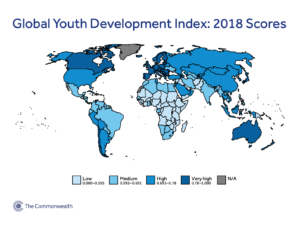The 2020 index that measures the status of young people in 181 countries around the world has ranked Nigeria in the 161 positions out of the 181 countries measured.
Tagged ‘Global Youth Development Index’, the index was released by Commonwealth Secretariat, where Singapore ranked top for the first time followed by Slovenia, Norway, Malta and Denmark. Chad, the Central African Republic, South Sudan, Afghanistan and Niger came last respectively.
The triennial rankings of youth development in 181 countries, also show that 156 of them recording at least slight improvements in their scores.
While the data used in the index pre-dates COVID-19, the report highlights the positive trajectory of youth development which the virus could reverse for the first time unless urgent action is taken to secure the pre-pandemic gains.
Key highlights
The index ranks countries between 0.00 (lowest) and 1.00 (highest) according to the developments in youth education, employment, health, equality and inclusion, peace and security, and political and civic participation. It looks at 27 indicators including literacy and voting to showcase the state of the world’s 1.8 billion people between the age of 15 and 29.
Afghanistan, India, Russia, Ethiopia and Burkina Faso were the top five improvers, advancing their score, on average, by 15.74 percent. On the other hand, Syria, Ukraine, Libya, Jordan and Lebanon showed the greatest decline in youth development between 2010 and 2018.
 Global trends
Global trends
Overall, the index shows advances in youth’s participation in peace processes and their education, employment, inclusion and health care since 2010.
Health made the largest gains of 4.39 percent driven by a 1.6 percent decline in global youth mortality rates and a 2 percent drop in each HIV, self-harm, alcohol abuse and tobacco use. Sub-Saharan Africa made the greatest strides in improving the health of young people.
Levels of underemployed youth and those not in school, training or work remained constant. Advances in inequality and inclusion are led by improved gender parity in literacy as well as fewer child marriage cases and pregnancies in girls under 20. Yet no progress occurred in women’s safety.
The global education score increased by 3 percent, with South Asia making the largest improvement of 16 percent followed by sub-Saharan Africa with 10 percent. Peace and security improved by 3.41 percent, resulting from fewer young people dying from direct violence. Somalia recorded the largest gains in the peace and security of young people, followed by Colombia, Sri Lanka, Eritrea and Russia.
Youth participation in politics is the only domain to record a decline in most parts of the world, reporting a deterioration in 102 countries. However, sub-Saharan Africa recorded a 5 percent improvement in the average regional score.
Globally, Sweden leads on education, Luxembourg on equality and inclusion, Indonesia on political and civic participation while Singapore tops the employment, health, and peace and security domains.
‘An empowered generation’
Speaking before the release, Commonwealth Secretary-General The Rt Hon Patricia Scotland QC said: “Young people are indispensable to delivering a future that is more just, inclusive, sustainable and resilient. By measuring their contributions and needs with hard data, our advocacy for their development becomes more powerful, and we are then able incrementally to increase the positive impact and benefits youth are able to add towards building a better future for us all.
“Our Youth Development Index is a vital tool which has already significantly enhanced our capacity to assess the extent to which youth are engaged to contribute beneficially in their societies, and empowered by enabling policies and tools.”
She added: “While the data used to compile the index was gathered before the COVID-19 pandemic, the findings indicate where progress was being achieved and where it was not, and that urgent action is now needed so that pre-pandemic gains are not lost but sustained and developed further, more broadly and more inclusively.
“As we work to recover and rebuild from the many consequences of the pandemic, we need to draw as fully as possible on the energy and idealism of youth so that fresh opportunities for social, economic and political development are opened up with the present and future generations of young people equipped and empowered to fulfill their potential.”
Recommendations
Among its recommendations, the index calls for more investment in lifelong digital skilling of young people, mental health services, apprenticeships, road safety and youth participation in decision-making to reverse trends that adversely impact them.
It further urges governments to improve data collection on education and diversify how they measure digital skills and online engagement of youth.
In a pre-recorded message, the Prime Minister of Antigua and Barbuda, Hon Gaston Browne, said: “It is an important index which offers empirical evidence as to the level of youth development within the Commonwealth. It establishes a baseline so that youth development can be monitored regularly and we can see how we are closing the identified gaps.”
The index, which draws on multiple data sources, was to be released at the now-postponed Commonwealth Heads of Government Meeting (CHOGM) in 2020. However, with CHOGM being postponed again until 2022, it was decided to release the index this year.



